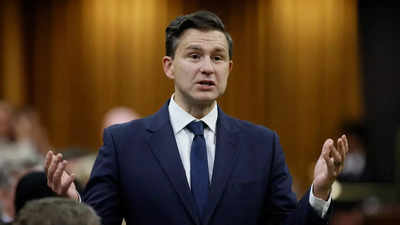On Monday, Canadian Prime Minister and Liberal Party leader Justin Trudeau announced his resignation, shocking many across the nation. He plans to step down once the party selects a new leader, marking the end of a significant era in Canadian politics. Trudeau’s tenure was defined by numerous policy decisions across various sectors, including immigration, which garnered both support and criticism.
As Trudeau exits, speculation surrounds his potential successor. Conservative leader Pierre Poilievre is emerging as a strong contender for the position, bringing with him a starkly different stance on immigration. Known for his sharp criticism of Trudeau’s immigration policies, Poilievre has pledged to overhaul Canada’s immigration system, making this issue central to his political platform.
Pierre Poilievre’s Stance on Immigration
Poilievre has been vocal about the need for reform in Canada’s immigration system. In December, he criticized Trudeau’s handling of immigration, particularly highlighting the surge in international students and low-wage temporary foreign workers. According to a TNN report, Poilievre argued that this surge disrupted Canada’s long-standing view of immigration as a positive force.
The TNN report further highlights that Poilievre has proposed tying immigration rates to the country’s capacity to support newcomers, focusing on housing, healthcare, and employment availability. “We will link the number of people coming into this country with the number of homes, the amount of health care, and the availability of jobs,” he stated. This policy would effectively cap immigration levels, ensuring that population growth aligns with Canada’s resources.
Furthermore, Poilievre has pledged to address perceived abuses within the temporary foreign worker and international student programs. He vowed to “block temporary foreign workers where they are taking jobs from Canadians,” signaling a shift toward prioritizing domestic labor over foreign workers, as reported by TNN.
Poilievre’s leadership: What can international students expect?
If Poilievre becomes the next Prime Minister of Canada, international students there may face heightened challenges due to stricter immigration caps tied to housing, healthcare, and job availability. Study permits could become harder to secure, intensifying competition for admission. Revised eligibility for work programs may limit off-campus employment opportunities, crucial for many students. Stricter oversight of institutions and reduced pathways to permanent residency could increase uncertainty, higher costs, and administrative barriers, reshaping Canada’s appeal for global talent.
Stricter Caps on Immigration Rates: With Poilievre’s proposal to cap immigration rates based on housing, healthcare, and job availability, the number of study permits issued to international students could decrease. This might make it more competitive and challenging for students to secure admission and permits to study in Canada.
Revised Eligibility for Work Programmes: Poilievre’s focus on preventing temporary foreign workers from taking jobs away from Canadians could lead to stricter regulations for international students working off-campus. This might limit opportunities for part-time work, which many students rely on to fund their education and living expenses.
Tougher Oversight of International Student Programs: Poilievre has vowed to address perceived abuses within international student programs. This could result in stricter oversight of designated learning institutions (DLIs) and potentially tighter criteria for program approvals, affecting students enrolled in private or less-regulated colleges.
Potential Reduction in Pathways to Permanent Residency: By tying immigration to resource availability, Poilievre’s policies could reduce the number of permanent residency (PR) pathways available to international students post-graduation. Students might find it harder to transition from study permits to work permits or PR status under the Post-Graduation Work Permit Program (PGWP).
Increased Uncertainty and Costs: The combination of capped immigration rates and stricter regulations might increase uncertainty for international students regarding their future in Canada. They may face higher administrative hurdles, longer processing times, or additional costs associated with obtaining or renewing permits.





